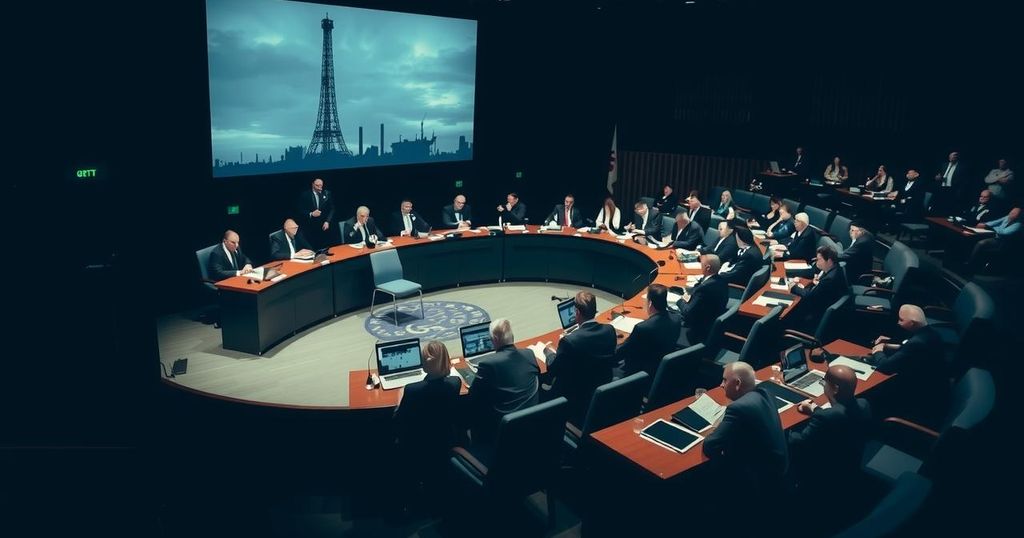Enforcing the ‘Polluter Pays’ Principle at COP29: A Call for Climate Accountability

COP29, scheduled for November 2024 in Azerbaijan, must enforce the ‘polluter pays’ principle to ensure accountability for greenhouse gas emissions. Despite historical commitments from prior COPs, insufficient action from major emitters remains a significant barrier to achieving climate goals. Key measures proposed for COP29 include the elimination of fossil fuel subsidies, a global liability framework for climate damages, and stricter financial disclosure regulations.
The upcoming COP29, scheduled for November 2024 in Azerbaijan, presents a crucial opportunity for the global community to reinforce the principle that polluters must pay. This principle has long underpinned climate change discussions, asserting that those responsible for pollution should shoulder the costs associated with managing and rectifying its impacts. Despite having theoretical acceptance, its practical enforcement remains inadequate, particularly with major greenhouse gas emitters often facing little or no financial repercussions for their actions. Historically, previous climate conferences, including COP17 in Durban in 2011, initiated frameworks like the Durban Platform for Enhanced Action to establish emission reduction plans. However, these initiatives did not yield significant reductions at the source, leading to ongoing emissions crises. According to the 2015 Paris Agreement, countries merely made voluntary Nationally Determined Contributions (NDCs) toward reducing emissions, allowing many to evade consequences for non-compliance, as exemplified by the United States’ withdrawal in 2017 without penalties. COP29 must rise to the occasion by implementing enforceable strategies that hold corporations and nations accountable for their emissions. Effective measures could include: 1. Ending Fossil Fuel Subsidies: The fossil fuel industry has benefitted from approximately $7 trillion in subsidies globally, contributing significantly to greenhouse gas emissions. Eliminating these financial incentives is essential in transitioning to cleaner energy sources. 2. Mandatory Climate Finance Liability: A global climate liability framework should be established to ensure that corporations responsible for substantial emissions compensate affected regions, similar to responsibility mechanisms for oil spills. 3. Carbon Pricing and Taxation: This should encompass a comprehensive assessment of climate damage costs associated with carbon emissions, incentivizing polluters to adopt cleaner technologies. 4. Legal Accountability: COP29 should prioritize international legal avenues to assert accountability for climate damages. New frameworks could facilitate climate-related lawsuits against those responsible for excessive emissions. 5. Financial Transparency Regulations: Stricter corporate disclosure laws will enable better identification of polluters and their environmental impacts, promoting accountability. 6. Historical Emission Accountability: Creating mechanisms to hold fossil fuel companies accountable for their historical emissions is critical for establishing a “climate reparations” fund. The success of COP29 hinges on the international community’s commitment to implement these substantial reforms, ensuring the burden of climate change mitigation does not disproportionately affect developing countries like those in Africa, which contribute minimally to global emissions yet suffer significantly due to climate impacts.
This article focuses on the principles and expectations surrounding COP29, the 29th Conference of the Parties, scheduled to occur in November 2024 in Azerbaijan. The central theme emphasizes the urgent need to enforce the ‘polluter pays’ principle, a long-standing tenet in climate discussions that mandates those responsible for pollution to bear the associated costs. The call for more robust measures at COP29 comes amidst a backdrop of insufficient accountability from major greenhouse gas emitters, despite prior conferences that initiated frameworks for climate action. The implications of COP29 are vast, particularly for developing nations facing climate-related challenges without having been the primary contributors to global emissions.
In conclusion, COP29 represents a pivotal moment for the global community to address the insufficient enforcement of the ‘polluter pays’ principle in climate discussions. By adopting critical measures such as ending fossil fuel subsidies, implementing mandatory climate finance liabilities, and establishing legal frameworks for accountability, COP29 may usher in a new era of climate justice. The success of this conference will significantly depend on the collective will of nations and corporations to acknowledge their responsibilities and contribute fairly to climate remediation, particularly towards the most vulnerable communities disproportionately affected by climate change.
Original Source: nation.africa






